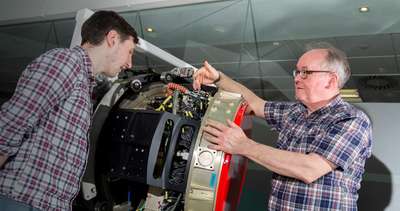Added: Over a year ago by Leonardo
The programme to create Britain’s new Tempest combat jet for the Royal Air Force (RAF) will define the nation’s engineering landscape for a generation. With the aircraft expected to enter service in 2035 and be operated for decades to come, a young engineer joining a company like Leonardo UK – the Team Tempest electronics lead – could conceivably work exclusively on the jet for their entire career.
But a programme like Tempest, which aims to speed up development by drawing on the lessons learned from building previous combat jets, faces a key challenge. How do the companies involved preserve the essential knowledge and experience gained from programmes like Tornado and Typhoon as older workers retire and are replaced by the next generation?

The answer being put forward by Leonardo UK is its new ‘brain-to-brain’ initiative. Here, experienced engineers approaching retirement spend some of their final year in employment passing their hard-earned know-how on to the company’s younger staff. The first cohort of employees to undergo the programme are those currently working on the Tempest radar team at Leonardo in Edinburgh, who are developing technologies that will be at the core of the future jet’s combat capability.
The benefits of this programme could be vast. Some of the skills required to build a fighter jet, though critical to the success of the project, are extremely niche. For example, very few people in the UK have amassed experience in managing the interplay of mass, power and cooling requirements across an entire combat jet. The good news is that many of the people with these kinds of skills are still working for Team Tempest companies. However, building combat aircraft has historically been a long process (the Eurofighter Typhoon, which the RAF flies today, began development in the 1980s) and so many key individuals are now on the verge of retirement.
Leonardo is very aware of this risk. 30% of engineers in the Tempest radar team are younger than 30 and another 30% are over 55. At the company’s Edinburgh site where the team is based, 25% of engineers are 55 and older, holding an astonishing 19,876 years of experience between them. This means that knowledge transfer is critical if the business wants to avoid a sudden cliff edge of ‘experience drain’.
The company is also taking into account that hiring highly-educated young engineers (the Tempest radar team includes 25 doctorates and a professor) following long courses of postgraduate study means that many in their mid-late 20s may have only spent a very short amount of practical time in industry and could therefore benefit from the know-how of an experienced mentor.
One of the first to join the brain-to-brain initiative is Euan Fowler (32), an electronic engineer working on new radar technologies for the Tempest project. Euan has been paired with George Fisher (65), who worked on both the Tornado and Typhoon combat aircraft and retired last year. He has returned to the business to pass on his combat jet expertise.
"For me" says Euan, "it’s been a great opportunity to work alongside someone who has been where I am now on fast-jet projects in the past, so that together we can discuss what slowed down the previous projects, or what added unnecessary costs, and take those things out of the design right at the start of this new development programme. That’s how we’ll meet the ambitious timescales of Tempest."
The format of Leonardo’s brain-to-brain programme, developed in partnership with nearby Edinburgh College, is simple. Engineers in their last year with the company, or who have retired in the previous 12 months, agree to a structured programme of mentorship for an identified young engineer. This incorporates one-to-one directed coaching and a large component of shadowing, for more informal transfer of knowledge.
Of course, personal chemistry is a very important x-factor in the brain-to-brain programme, as experienced engineers will be passing on the very personal lessons from the successes and failures they’ve experienced throughout their careers. It’s a very intimate changing of the guard and it’s not for everyone. "There’s a large bespoke element as every individual has different ways of communicating," says Fisher, adding "you need to be ready to dedicate yourself to the process, it doesn’t work for everyone and we’ve had a couple of people drop out. Largely though, it’s been a big success."
But why not just have the experienced engineers write a book or how-to guide about their experiences and pass on knowledge that way? Fisher responds that it’s not possible to simply write down experience because "you just wouldn’t know where to begin. Some of the most important teaching that comes out of this process is sparked during discussions – it’s things you’ve learned during your career that you may not have realised you’ve learned until it comes up during the mentoring."
Uptake so far has been strong. Young Tempest engineers are enthusiastic to hear about how previous generations solved the problems they’re facing today and their thoughts on how to avoid dead-ends that could slow down the programme. The brain-to-brain scheme has also been praised by some experienced engineers who have moved into management positions later in their careers, but found themselves craving a return to the hands-on engineering of years past.
"It’s a last chance to get back into proper engineering for those of us who got promoted to more people-management roles, but ended up missing the day-to-day work on electronics," said Fisher, concluding "It also means a lot to me that some of the knowledge I’ve picked up throughout my long career working on combat jets is going to help some of these young engineers have successful careers themselves. I want them to be prepared for the challenges they’ll face in developing the next generation of combat aircraft."